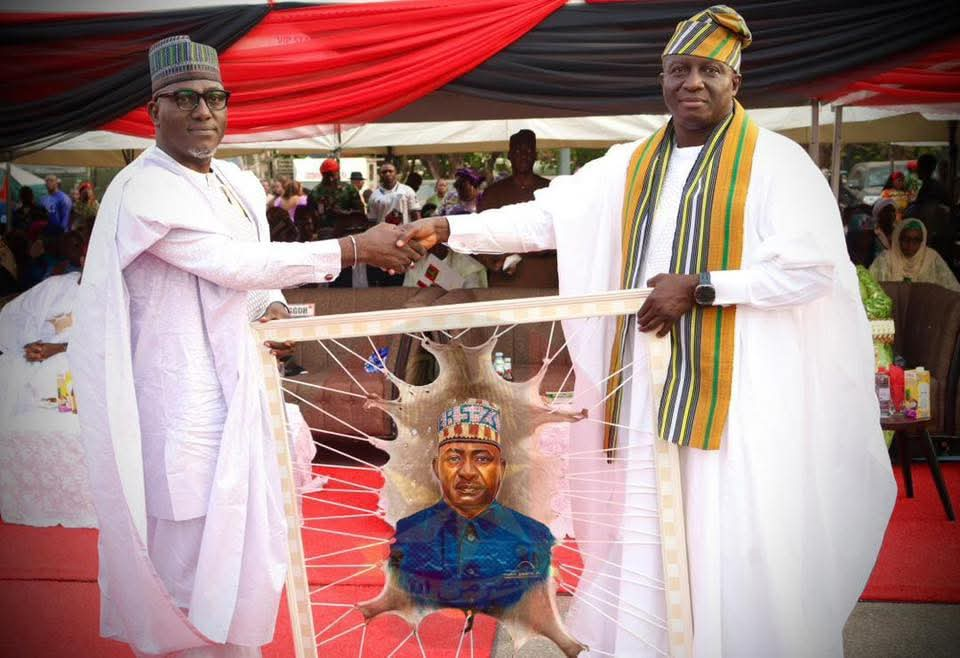300 years after it started during the reign of the first Soun, the people of Ogbomoso have continued to celebrate the Oole Oba festival under the Ajagbon tree at the back of the Soun’s palace. SUNDAY ADEPOJU who covered the 2020 edition of the festival reports that it was a forum to promote unity among the people and the five Ogbomoso royal families.

Eminent personalities, the five Soun royal families, well wishers and culture enthusiasts from Ogbomoso and the rest of the world on Friday, March 20 converged on the palace of the Soun of Ogbomoso, Oba Jimoh Oyewumi Ajagungbade, to celebrate the annual Oole Oba festival. And as it is traditionally done, the festival took place under the historic Ajagbon tree which was, interestingly, the same Ajagbon tree under which Lorun-un-ngbekun, the wife of the first Soun of Ogbomoso, sold the then popular otika – a local alcoholic drink, over 300 years ago.
Oole Oba, formerly referred to as Oole Baale, is one of the festivals celebrated in Ogbomoso, Oyo State. Though no specific date of its origin has been given, Nigerian Tribune gathered that the history of the legendary cultural event dates back to over 300 years, as it started during the reign of Ogundiran Ogunlola, the first Soun who reigned between 1659 and 1714. It is a royal event in which the five Soun royal families and well wishers from Ogbomoso and beyond come together to celebrate and showcase their cultural heritage and propagate history.
Though invitations are not usually sent to dignitaries, there was still a large turnout of people at the event, some even in uniforms to add to the aesthetics of the event.
“For this traditional event, we don’t send invitations. If it is our tradition to send invitations, I know some bigwigs, business moguls and philanthropists that we have in Ogbomoso and in the state will want to contribute to it. The reason is that the event is exclusively a royal traditional festival that has to do with the families of the Soun of Ogbomoso. The Kabiesi, Soun, will be with his family and they will celebrate the festival together,” Mr Toyin Ajamu, secretary to the Soun of Ogbomoso, explained.
Usually at the event, the monarch sits and the five royal families, together with their masquerades, march in a procession before him to pay homage and get his blessings. And to maintain tradition, the food served at the palace during the festival is eko (pap) and oole (moin moin, a delicacy made from beans) from which the name of the festival is derived. Oole is a steamed bean pudding made from a mixture of washed and peeled black-eyed peas, onions, fresh ground pepper and oil.
Emphasising the significance of the festival, Ajamu, said Oole Oba would aid the city’s development, adding that the event should rank among other prestigious festivals in the country. He charged stakeholders in tourism and culture to promote the festival.
“An event of this magnitude is capable of aiding the development of Ogbomoso by bringing tourists into Ogbomoso. We have other events across the nation like Ojude Oba in Ijebu-Ode town, Argungu in Kebbi State and Osun Osogbo, among others. Foreign tourists do visit when such festivals are on. They try to promote what they see at the festivals and by this, the wider world can know about the various aspects of the different cultural heritages,” Ajamu said.
He, however, stated that more still has to be done to move the Oole Oba to the next level, just like other festivals are promoted.
“Really, tourists have been coming to Oole Oba festival here in Ogbomoso. But, it is just quite unfortunate that the tourists don’t promote it the way it should be promoted. So, I advise tourists to come and promote it. If Osun Osogbo, Ojude Oba and Argungu festivals had not been promoted by various organisations and foreign investors and tourists, people would not have known much about them.
“I advise the Oyo State government and foreign tourists to fund this event, Oole Oba, being one of the popular festivals in the state in order to showcase our rich cultural heritage to the outside world. We can notice that some things are fading away in Yoruba community because of foreign religions: Christianity and Islam. Our tradition is fading away. I will say that some traditions don’t have spiritual implications, impacts and attachments. When you are far off, you will think it is about traditional spirituality but when I came on board as the secretary to Kabiesi, I discovered that it is not all about spirituality,” Ajamu noted.
The Mogaji of Bolanta royal family, Prince Samson Oyediji Oyedeji, congratulated Oba Oyewumi on the festival which he described as important to the town. “Today’s festival is a significant event in Ogbomoso. Unlike in the recent past, the five mogajis, the heads of the royal families, are now complete and are present in this year’s edition. That is why the Kabiesi is happy because we, the mogajis, are present at this year’s event. The five royal masquerades called egungun alago were also complete and they paid homage to Soun’s stool,” he said.
On the need to improve the festival, Mogaji Oyedeji said “What we do now is to call all the five ruling houses to sit down and deliberate on the way forward in our style of celebrating and promoting our culture. We will start planning for the next edition which will come up next March. Even, during this year’s edition, many of our brothers came from overseas. At the event, some of our princes and princesses came from Canada, United States and all that. A professor from Itabiyi family came and we discussed. By next year, it will be more than this.”
In the spirit of unifying the families, showcasing cultural heritage and defending the territorial integrity of Ogbomoso, two princesses from Gbagungboye/Oyewumi royal house spoke on the significance of the festival and also maintained that a traditional event such as Oole Oba serves the purpose of defending the territory of the city and unifying the families.
Princess Nurisat Bello-Oyewumi said, “The festival is a unifying factor that connects the five royal families together. We celebrate it in grand style because our progenitor, Soun Ogunlola, started it long ago. In some cases, you would find that men and women of the same family have married one another. The festival is important because we get to know one another as members of one family. This year’s edition is remarkable because people came from far and near to witness our culture and tradition in terms of our dressing, dancing, exhibiting different masquerades, and the various artifacts and architecture in our ancient palace.
“It is a propagation of history because other people will get acquainted with our rich history, especially now that many indigenous cultures are being eroded by westernisation. We sang, we danced and we displayed the royal masquerades called egungun alago. Two masquerades from Gbagun/Oyewumi family, one from Aremo (Laoye) family, one from Bolanta family, one from Bolodeoku family all performed brilliantly.
“Then, Kindin, Oya and Lobanika masquerades too also performed to the admiration of the people in attendance and passers-by. These royal masquerades and others are non-violent and are symbolic of our culture. Another of our culture is that it is only the king’s masquerade that can have the long costumes supported by two sticks. It is symbolic and the five masquerades have long costumes.”
Speaking with the Nigerian Tribune, Falilatu Amope Oyewumi, an elderly princess, lauded Oba Oyewumi for his resoluteness to unite the families and promote the festival. She also corroborated that traditional festivals are meant to protect the community. “There is no cultural event in Ogbomoso that doesn’t have to do with protecting the city. Even, Oro, another traditional festival, is meant to protect the city. Preceding the popular July Egungun Festival in Ogbomoso, Oro is a worship of Ogun O Jalu (at Ojaagbo, Ogbomoso, close to Ogunlola Township Hall) which, is believed, shields the city from being invaded by enemies or conquered.
“The Oro worshippers would appease gods for protection from attacks. However, it is a taboo for any woman to see the Oro and any woman who sees it will die,” Amope Oyewumi revealed.
Culled from Nigerian Tribune





